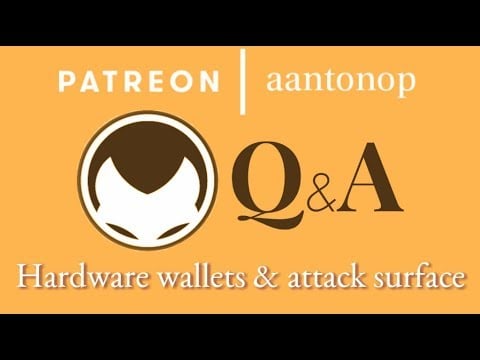Can you give a basic introduction to hardware wallets? Why are bitcoin “wallets” more like keychains? How do we balance ease of use and security? What are possible ways to attack a hardware wallet? Why should you broadcast transactions through your own full node?
See the documentation and support pages of various hardware wallets for more information:
Trezor – https://doc.satoshilabs.com/trezor-faq/overview.html https://blog.trezor.io/using-advanced-recovery-on-trezor-4af0eb53c3bb
Ledger Nano S – https://support.ledgerwallet.com/hc/en-us/articles/360000613793-Initialize-your-device
Ledger Blue – https://support.ledgerwallet.com/hc/en-us/articles/360005835414-Initialize-your-device
KeepKey – https://help.keepkey.com/start-here/initialize-your-keepkey https://help.keepkey.com/how-to-guides/how-to-recover-your-keepkey
These questions are from the March and (rescheduled) April monthly Patreon Q&A sessions, as well as ‘The Internet of Money’ tour in Dublin, Ireland, which took place on March 31st, May 5th, and May 23rd 2018 respectively. Andreas is a teaching fellow with the University of Nicosia. The first course in their Master of Science in Digital Currency degree, DFIN-511: Introduction to Digital Currencies, is offered for free as an open enrollment MOOC course to anyone interested in learning about the fundamental principles. If you want early-access to talks and a chance to participate in the monthly live Q&As with Andreas, become a patron: https://www.patreon.com/aantonop
Watch the full event talk here: https://youtu.be/mPMsbgWl9p4
RELATED:
How do I choose a wallet? – https://youtu.be/tN6b62sEpsY
Secure, tiered storage system – https://youtu.be/uYIVuZgN95M
Setting up secure storage devices – https://youtu.be/wZ9LxLLvfXc
What is a private key? – https://youtu.be/xxfUpIV9wRI
How do mneomonic seeds work? – https://youtu.be/wWCIQFNf_8g
Using paper wallets – https://youtu.be/cKehFazo8Pw
Wallet design and mass adoption – https://youtu.be/WbZX6BDZJHc
Cryptographic primitives – https://youtu.be/RIckQ6RBt5E
Public keys vs. addresses – https://youtu.be/8es3qQWkEiU
Re-using addresses – https://youtu.be/4A3urPFkx8g
Coin selection and privacy – https://youtu.be/3Ck683CQGAQ
Multi-signature and distributed storage – https://youtu.be/cAP2u6w_1-k
Nonces, mining, and quantum computing – https://youtu.be/d4xXJh677J0
Software distribution security – https://youtu.be/_V0vqy046YM
Protocol development security – https://youtu.be/4fsL5XWsTJ4
Geopolitics and state-sponsored attacks – https://youtu.be/htxPRTJLK-k
How to get people to care about security – https://youtu.be/Ji1lS9NMz1E
Honest nodes and consensus – https://youtu.be/KAhY2ymI-tg
Why running a node is important – https://youtu.be/oX0Yrv-6jVs
Andreas M. Antonopoulos is a technologist and serial entrepreneur who has become one of the most well-known and respected figures in bitcoin.
Follow on Twitter: @aantonop https://twitter.com/aantonop
Website: https://antonopoulos.com/
He is the author of two books: “Mastering Bitcoin,” published by O’Reilly Media and considered the best technical guide to bitcoin; “The Internet of Money,” a book about why bitcoin matters.
THE INTERNET OF MONEY, v1: https://www.amazon.co.uk/Internet-Money-collection-Andreas-Antonopoulos/dp/1537000454/ref=asap_bc?ie=UTF8
[NEW] THE INTERNET OF MONEY, v2: https://www.amazon.com/Internet-Money-Andreas-M-Antonopoulos/dp/194791006X/ref=asap_bc?ie=UTF8
MASTERING BITCOIN: https://www.amazon.co.uk/Mastering-Bitcoin-Unlocking-Digital-Cryptocurrencies/dp/1449374042
[NEW] MASTERING BITCOIN, 2nd Edition: https://www.amazon.com/Mastering-Bitcoin-Programming-Open-Blockchain/dp/1491954388
Translations of MASTERING BITCOIN: https://bitcoinbook.info/translations-of-mastering-bitcoin/
Subscribe to the channel to learn more about Bitcoin & open blockchains!
Music: “Unbounded” by Orfan (https://www.facebook.com/Orfan/)
Outro Graphics: Phneep (http://www.phneep.com/)
Outro Art: Rock Barcellos (http://www.rockincomics.com.br/)
source











Andreas !!!!❤️❤️❤️❤️❤️❤️?????
Now current version of bitcoin core 18.0 supports hardware wallets
Enjoy
Hey, How about adding a 25th words, or password, that only us know to confirm is our seedphrase? If someone steals our 24 words, he(she) will have to add our specific password to confirm being the owner.
What happens when the hardware wallet company goes out of business and you lose the hardware wallet? How can you re-create the private keys from the seed phrase?
Another question is: Can I use Trezor when Trezor company goes out of business?
I have a hardware wallet but what about Saleem Rashid who found the Ledger vulnerability? Couldn't other bad actors find vulnerabilities?
Fantastic information thankyou very much. Do you think nano ledger are a food option ? Thankyou again
How is this concept ever going to be adopted cheaply, securely and to be easy to use worldwide? In the way this sounds, this will never reach all the poor people in the world in which this was initially intended and promoted along that lines in the beginning. And my first and foremost concern is having my personal information (ID) online in order to have a variety of transactional wallets.
what if trezor company is not there is 10 years how would that work?
Very interesting FAQ, thank you. About hardware wallet, I would add the following question: How can we be sure that hardware wallet are not pre-seeded or there is no failure (like not well randomized seed generator) ?
Please guys tell me how much time will take to find the keys for satoshi's wallet, for any "lost forever" wallet. if the key is just a number-letter line in the right order then find it by simple guessing is just a matter of time and energy, right?
Andreas, at 16:55 you state that one can initialize a „watch-only“ bitcoin core node with an xpub key so that it watches the balance of your wallet. I‘ve tried importing my xpub key into my satoshi 0.16.1 node, but get error messages „…must be hex string“. How exactly are you supposed to do that? The answers on stackexchange say it’s impossible…
Linux, veracrypt and a USB drive are also helpful.
Id love to see where he is finding 35 dollar hardware wallets with screens.
Your opinion on DPOS?
Great, I was just getting into wallets! Will watch later as I'm looking for a "vault" that can hold most coin's keys.
Andreas, security wise would you recommend trezor one or model t? They say firmware is different on model t implying like it is " better ". Is that just marketing to sell new more expensive option or it actually is?
It"s good, that Bitcoin core support BIP 39 and pip 32 hierarchal deterministic wallets?
Is it possible to run the bitcoin software in offline mode to generate addresses and sign transactions? I read you can get it to connect with localhost on startup.
how do you import a master public key into bitcoin core? seems like this is not possible 🙁
Very informative . A.A. – What is the best way to store the BIP 39 phrase? Perhaps encode it in some way and keep it online, to protect from the sock drawer attack? Or bury it in the ground, or a bank safe?
How is this guy everywhere?
thank you, just Patreoned last week! Hardware wallet are extremely cool! yes huge amount of rich paranoid or just investor type of people might wanna use ''banks'' or ''Coin Vaults'' like Coinbase that might become one of the biggest bank in my opinion, but never the less like keeping some cash, the point of a hardware wallet is extremely relevant because its the true decentralized way of accessing your keys instead of using a third party that really cancel the benefit of this technology!!
keep posting more video this tech is so relevant and revolutionary im starting a new Youtube channel and with video in French since theres not a lot to try to help all french Canadians here that think that Open Borderless Censorshipresistant cryptocurrencies like BTC ETH are scams…
He is doing God's work by propagating this knowledge.
Just on the mnemonic phrase topic, say that Trezor is stolen, the race to sweep the wallet begins. as ordering a new Trezor may take some time. what do you suggest to open that 24 word phrase to re send the funds somewhere else? this is a very very important step.
Excellent, as usual.
Brilliantly explained, as usual. Great job once again.
Andreas rocks! ? ?
We can all say that Andreas is the GOAT!!! Thank you ol wise one!
Andreas, thanks once again. I've bought a BitFi "unhackable" wallet… but I'm not sure if it is safe or not since BitFi company did not release their algorithm to the public yet and I don't know what device hardware really does.
Would you have any advice on this, please. Cheers!
You've made me very paranoid.
great video Andreas – always informative
If(andreas) likes++;
naaaaa you didnt just bring the rock meme!!!! whaaaaaaaaaaaaa… bull run confirmed…
Watched , understood , liked and shared = true ;
Greetings from Kenya